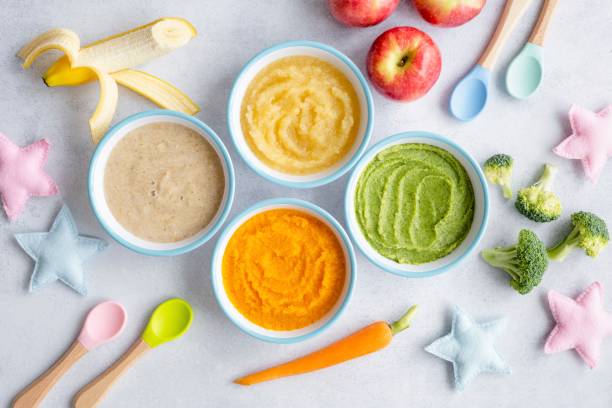There’s a moment that sneaks up on almost every new parent: you’re in the kitchen, staring at your adorable, gummy-smiled baby thinking, “What on earth can I feed you if you don’t have any teeth?” It almost feels like a riddle, doesn’t it?
Here’s the good news: babies don’t need teeth to enjoy a wide variety of foods. Gums are surprisingly strong, and with the right textures and care, you can introduce wholesome, satisfying meals without waiting on those tiny pearly whites.
Let me walk you through 17 baby-friendly foods that require zero chewing power but are packed with flavour, nutrients, and texture.
1. Bananas – The Classic Starter
Bananas are like the comfy sweatpants of baby foods, soft, dependable, and universally loved. They mash easily, are rich in potassium, and have a mild sweetness that babies adore. You can serve it mashed with a fork or in long slices for baby-led weaning.
Pro tip: Roll banana slices in crushed oats or baby cereal to make them easier to grip.
2. Avocado – Nature’s Butter
Smooth, creamy, and full of healthy fats that support brain development. You can mash it or slice it into strips. Avocado is also a blank canvas; mix it with a little banana or breastmilk if your baby isn’t sold on the flavour at first.
3. Steamed Carrots – Tender and Sweet
Carrots get a bad rep for being a choking hazard, but that’s only when they’re raw. Steamed until soft, they become wonderfully mashable and sweet. Just make sure they’re squishably soft before offering.
4. Scrambled Eggs – Fluffy and Protein-Packed
Eggs are a little like magic. Scrambled until soft and fluffy, they’re easy for your baby to gum and loaded with protein and choline. Bonus? They’re super fast to make.
Allergens? Yes, eggs are one of the top ones. But introducing them early (around 6 months) may actually reduce risk. Always talk to your pediatrician first.
5. Mashed Potatoes – The Comfort Food Hero
Creamy, warm, and soothing, mashed potatoes are practically a hug in a bowl. Stick with plain mashed (no salt, butter, or cream yet) and mix with a little breastmilk or formula if needed.
6. Yoghurt – Cool and Creamy Goodness
Full-fat plaiyoghurtrt is a nutritional powerhouse for babies over 6 months. Rich in calcium, probiotics, and protein, it’s perfect for those hot days or snacky afternoons.
Skip flavored yogurts. They usually sneak in added sugars your baby doesn’t need.
7. Oatmeal – Gentle on the Belly
Whether you go old-fashioned or baby cereal, oatmeal is warm, filling, and easy on the digestive system. Stir in some mashed fruits for variety (think peaches, applesauce, or even a touch of peanut butter).
8. Ripe Pears – Juicy and Gentle
Pears are sweet, soft, and surprisingly low-allergen. Steam them lightly if they’re firm, or serve ripe slices straight up. Great finger food for babies experimenting with textures.
9. Soft-Cooked Pasta – Yes, Pasta!
Tiny pasta shapes like orzo, ditalini, or broken spaghetti are perfect when overcooked slightly to be soft. Serve plain or with a baby-safe veggie puree.
10. Tofu – The Underrated Superfood
Tofu often gets a side-eye from parents, but it’s soft, packed with protein, and takes on whatever flavour you add. Cut into cubes for finger food or mash into purees.
Try silken tofu mixed with banana or mango. It’s like baby pudding.
11. Butternut Squash – Sweet and Velvety
Roast it, steam it, mash it, butternut squash is baby heaven. It’s sweet enough to be a favourite, plus rich in vitamin A and fibre.
12. Applesauce – Oldie but Goodie
Unsweetened applesauce is gentle, familiar, and can be combined with other mashed fruits or grains. You can also steam and mash fresh apples yourself.
13. Well-Cooked Lentils – Tiny But Mighty
Red lentils cook fast and turn soft, making them perfect for little tummies. They’re rich in iron, fibre, and protein. Great mixed with mashed veggies or rice.
14. Cottage Cheese – Lumpy But Lovely
It’s got texture, protein, and calcium. Some babies love the curds; some need a bit of blending first. You can mix it with fruits or veggies for a more familiar flavor.
15. Sweet Potatoes – Baby MVP
If there were a baby food hall of fame, sweet potatoes would have their own statue. Roast, steam, or mash them; they’re creamy, sweet, and full of goodness.
16. Peas – Tiny, Mighty, and Sweet
Steam and mash them for bright green puree, or offer whole if baby can manage. Rich in vitamins A, C, and K, plus fibre and plant-based protein.
17. Rice – A Global Staple
Soft-cooked rice, especially short-grain or sticky rice, is gentle and easy to swallow. Mix it with purees or serve solo. Many cultures start solids with rice for a reason; it works.
Some Real Talk: What If Baby Gags or Refuses?
Honestly, it’s part of the deal. Gagging is not choking; it’s how babies learn to handle food safely. And refusing? Well, they’re still tiny humans with opinions. Keep offering. Keep trying. Sometimes, they need to see it five, six, or even ten times before giving it a go.
Quick FAQ for the Curious Parent
- Can babies chew without teeth?
Yes! Gums are strong. Think of how you can mash food with your tongue and the roof of your mouth. - What if I’m scared of choking?
Totally normal. Learn the difference between gagging and choking. Take an infant CPR class. And always supervise meals. - When should I introduce solids?
Around 6 months, but check for readiness signs: good head control, sitting up with support, and showing interest in food.
Wrapping It Up (With a Spoonful of Patience)
Feeding your baby doesn’t have to be a stressful science project. Teeth or no teeth, babies can explore flavors, textures, and even finger foods safely. The key? Keep it soft, stay calm, and have a little fun with the mess.
Because honestly, food smeared all over that tiny face? That’s what memories (and laundry days) are made of.
P.S. If you’re ever unsure about what’s safe, always check with your paediatrician. Every baby is unique, and so is their food journey.

